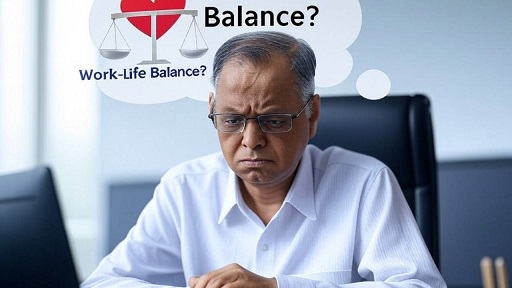Narayana Murthy's 70-Hour Work Week: A Mental Health Perspective | MetroPsychologist
Narayana Murthy's 70-Hour Work Week: A Mental Health Perspective | MetroPsychologist

### Narayana Murthy's 70-Hour Workweek Statement: Examining Health, Happiness, and Sustainability
Infosys co-founder NR Narayana Murthy recently stirred controversy with his suggestion that Indian youth should embrace a 70-hour workweek to boost India’s global competitiveness. While the idea aims to address productivity challenges, it raises significant concerns about its effects on health, happiness, and the sustainability of such intense work practices.
---
### The Statement in Context
Murthy’s call for extended work hours stems from his belief that India’s workforce productivity ranks among the lowest globally. He drew parallels to post-World War II Japan and Germany, where rigorous work schedules were pivotal in rebuilding their economies. According to Murthy, India’s youth need to adopt similar dedication to catch up with rapidly advancing nations.
However, this proposition transcends economic objectives, touching deeply on human well-being and societal development. A closer look reveals the complex implications of such a suggestion.
---
### Impact on Health
**1. Physical Health**
The toll of long working hours on physical health is well-documented. Studies by the International Labour Organization (ILO) show that consistently working over 48 hours a week increases the risk of cardiovascular diseases, obesity, and chronic illnesses.
For Indian youth, many of whom already face extended work hours, a 70-hour workweek could mean 14-hour days, leaving minimal time for exercise, proper nutrition, or rest. Such a lifestyle could exacerbate existing health challenges and strain an already overburdened healthcare system.
**2. Mental Health**
Psychologically, an intense work schedule heightens the risk of burnout, stress, and conditions such as depression and anxiety. Extended hours reduce opportunities for relaxation and personal connection, leading to isolation and decreased life satisfaction.
Globally, the emphasis is shifting towards achieving a healthier work-life balance, with increased focus on mental health. Murthy’s suggestion stands in contrast to this trend, potentially risking the creation of a generation of overworked and stressed professionals.
---
### Happiness and Well-Being
Happiness is not solely derived from financial or professional success. It stems from a balanced life that includes time for relationships, leisure, and personal growth.
A 70-hour workweek risks eroding the quality of life for India’s youth. Happiness indices consistently highlight the importance of personal interests, community involvement, and adequate rest. A singular focus on work neglects these critical components, potentially leading to diminished overall well-being.
---
### Sustainability of Work Practices
**1. Productivity vs. Hours Worked**
The relationship between productivity and hours worked is not linear. Studies have shown that beyond a certain point, longer hours lead to diminishing returns due to fatigue, reduced creativity, and lower efficiency.
Critics argue that rather than focusing on sheer hours, India should prioritize skill development, technological adoption, and efficient work practices to boost productivity sustainably.
**2. Cultural and Societal Considerations**
Murthy’s statement raises questions about the kind of work culture India should aspire to. While hard work and discipline are essential, they must be tempered with practices that promote long-term sustainability.
Global trends are shifting towards flexible work arrangements, remote working, and the right to disconnect—practices that prioritize human well-being alongside economic goals. India’s work culture should align with these trends to remain competitive in attracting and retaining talent.
**3. The Future of Work**
The future of work increasingly emphasizes humane practices, recognizing the importance of health, innovation, and quality of life. To build a thriving workforce, India must nurture its youth with balanced opportunities for professional and personal growth.
---
### Conclusion
Narayana Murthy’s vision for a more productive India comes from a place of ambition and aspiration. However, the implications of a 70-hour workweek extend beyond economics, affecting the physical health, mental well-being, and happiness of the workforce.
As India stands on the brink of becoming a global economic powerhouse, it is essential to foster a work culture that balances productivity with human needs. The challenge lies in crafting policies and practices that drive economic growth without compromising the well-being of its youth.
This debate sparked by Murthy’s statement offers a moment of reflection for India’s society and policymakers. The goal should not be to work harder but smarter—ensuring a sustainable and enriching future for individuals and the nation alike.
#WorkLifeBalance #MentalHealth #Productivity #NarayanaMurthy #70HourWorkweek #Sustainability #MetroPsychologist
© 2025 metropsychologist.com
